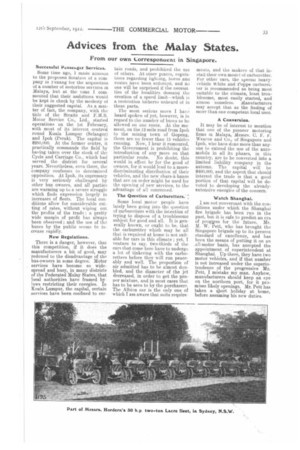Advices from the Malay States.
Page 13

If you've noticed an error in this article please click here to report it so we can fix it.
From our own IL-orresponuenc in Singapore.
Successful Passenger Services.
Some time ago, I made allusion to the proposen Rotation of a company in isenang for the acquisition of a number of motorbus services in Malaya, but at the time I commented that their ambitions would be kept in check by the modesty of their suggested capital. As a matter of fact, the company, with the title of the Straits and F.M.S. Motor Service Co., Ltd..,. started operations on the 1st February, with most of its interest centred round Kuala Lumpur (Selangor) and Ipoh (Perak). The capital is $280,000. At the former centre, it practically commands the field by having taken over the stock of the Cycle and Carriage Co., which had served the district for several years. Nevertheless, even there, the company confesses to determined opposition. At Ipoh, its supremacy is very seriously challenged by other bus owners, and all parties are warming up to a severe struggle which finds expression largely in increases of fleets. The local conditions allow for considerable cutting of rates, without wiping out the profits of the trade ; a pretty wide margin of profit has always been observed ; and the use of tha buses by the public seems to increase rapidly.
New Regulations.
There is a danger, however, that this competition, if it does the manufacturers a bit of good, may redound to the disadvantage of the bus-owners in some degree. Motor services have become so widespread and busy, in many districts of the Federated Malay States, that local authorities have framed bylaws restricting their energies. In Kuala Lumpur, the capital, certain services have been confined to cer
tain roads, and prohibited the use of others. At other places, regulations regarding lighting, horns and routes have been enforced, and no one will be surprised if the necessities of the localities demand the creation of a speed limit—which is a restriction hitherto unheard of in these parts.
The most serious move I have heard spoken of yet, however, is in regard to the number of buses to be allowed on one route. At the moment, on the 12-mile road from 'poll to the mining town of Gopeng, there are no fewer than 15 vehicles running. Now, I hear it rumoured, the Government is prohibiting the introduction of any more on that particular route. No doubt, this would in effect be for the good of owners, for it would lead to a morediscriminating distribution of their vehicles, and the new chars-b.-banes that are on order might, be used for the opening of new services, to the advantage of all concerned.
The Question of Carburetters.' 7 Some local motor people have lately been going into the question of carburetters with the intention of trying to dispose of a troublesome subject for good and all. It is generally known, or ought to be. that the carburetter which may be all that is required at home is not suitable for cars in this climate ; yet. 1venture to say, two-thirds of the cars that come here have to undergo a lot of tinkering with the carburetters before they will run peaceably and well. The proportion of air admitted has to be almost doubled, and the diameter of the jet decreased, in order to get the proper mixture, and in most cases that has to be seen to by the purchasers. The Albion car is the only one of .which I am aware that suits require.
merits, and the makers of that install their own model of carburetter. For other cars, the special heavyvehicle IS. hite and tioppe carburetter is recommended as being most suitable to the climate, least troublesome, most easily started, and almost, noiseless. Manufacturers may accept that as the finding of more than one competent local user.
A Conversion.
It may be of interest to mention that one of the pioneer motoring firms in Malaya, Messrs. C. F. i. Wearne and Co., of Singapore and lpoh, who have done more than anyone to extend the use of the automobile in all its phases, in this country, are to be converted into a limited liability company in the autumn. The capital will be $400,000, and the aspect that should interest the trade is that a good portion of that capital will be devoted to developing the alreadyextensive energies of the concern.
Watch Shanghai. I am not conversant with the conditions under which the Shanghai fire brigade has been run in the past, but it is safe to predict an era of proness for the future. Mr. M. W. Vett, who has brought the Singapore brigade up to its present standard of excellence, and has been the means of putting it on an .all-motor basis, has accepted the appointment of superintendent at Shanghai. Up there, they have two motor vehicles, and if that number is not increased under the superintendence of the progressive Mr. Pett, I mistake my man. Anyhow, manufacturers should keep an eye on the northern port, for it promises likely openings. Mr. Pelt has taken a short holiday at home, before assuming his new duties.




















